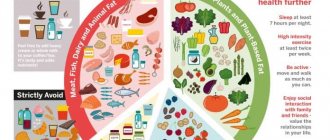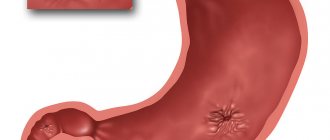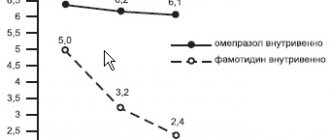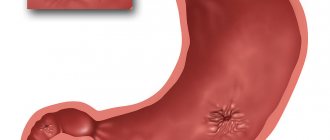What to do if you have high stomach acidity?
Stomach problems are one of the most common ailments that plague a huge number of people. Sometimes it is severe pain, sometimes constant nausea, and often vomiting and lack of appetite. There are many reasons for the occurrence of such problems, but one of the main reasons why a person feels discomfort is increased stomach acidity.
The natural physiological increase in acidity that occurs after eating occurs relatively unnoticed in a healthy person. It is also considered normal if the pH temporarily increases after eating certain foods - citrus fruits, tomatoes and tomato juice (paste, sauce), alcoholic drinks, etc. A condition in which the level of hydrochloric acid significantly exceeds the norm, regardless of food intake, is considered pathological.
Causes
The most common cause of increased stomach acidity is a nutritional factor, i.e., improper, irrational nutrition. Spicy, salty, fatty foods, and alcoholic drinks have an irritating effect on the gastric mucosa, as a result of which the parietal cells begin to secrete hydrochloric acid in greater quantities than required.
The nutritional factor also includes too rapid absorption of food. In this case, a poorly chewed bolus of food enters the stomach, not sufficiently moistened with saliva, containing too large particles. To digest it, a larger amount of gastric juice is required, and therefore hydrochloric acid, which leads to increased acid production, and therefore to an increase in the acidity of gastric juice.
Other causes of increased stomach acidity may include:
- Infection with the bacterium Helicobacter pylori. This is a unique microorganism that can survive in an acidic environment. Once in the stomach, bacteria produce urease, which has an irritating effect on its walls. In an effort to destroy these bacteria, stomach cells intensively synthesize hydrochloric acid and pepsin.
- Chronic stress. In itself, it does not have a negative effect on the state of the digestive system, however, being in a depressed state, a person stops eating properly, often smokes, drinks alcohol, which negatively affects the gastric mucosa.
- Long-term use of non-steroidal anti-inflammatory drugs and/or corticosteroids, as they have an irritating effect on the gastric mucosa.
- Smoking. Nicotine has a stimulating effect on parietal cells, resulting in an increase in stomach acidity.
First aid for hyperacidity
Antacids help neutralize the aggressive effect of hydrochloric acid, which is the main component of gastric juice. Simple soda has a similar effect. Soda does not have a cumulative effect; it has a one-time effect, neutralizing the acid present in the stomach. However, the powder contains sodium, which may have a negative effect on the course of some cardiovascular diseases.
Antacid medications contain magnesium, aluminum, bismuth and other components that have additional effects:
- antiseptic;
- antibacterial;
- regenerating.
Antacids are available in the form of a thick gel and in tablet form. Medicines envelop the mucous walls of the digestive tract, creating a specific barrier that protects the membranes from the pathogenically aggressive effects of hydrochloric acid. Preparations:
- Phosphalugel;
- Almagel;
- Rennie;
- Gastal.
Symptoms
Increased acidity very often occurs against the background of an imbalance in the process of regulating the acidity of the juice, as well as its neutralization. That is why, when acidity increases, a person may experience the following symptoms:
- Bloating.
- State of apathy, bad mood.
- Heartburn. It usually occurs either immediately after eating, or at the moment when a person takes a lying position. Heartburn is the reflux of stomach acid into the esophagus. The juice irritates the mucous membrane and therefore a strong burning sensation occurs, which is localized mainly in the Adam's apple area.
- Feeling of heaviness. This usually happens even after a small meal or snack.
- Pain. It can be either strong or not very strong. It occurs at the moment when acid enters the duodenum, or rather into its lumen. In addition, another cause of pain will be acid getting into damaged mucous areas. At the moment when their interaction occurs, the person feels a strong pain attack, which can last for several minutes. At the same time, it is difficult for a person to even move, the pain is so severe.
- Belching, which usually tastes either sour or bitter. Moreover, it appears mainly after eating.
- Problems with appetite. Due to the fact that after each meal a person suffers from pain or heartburn, appetite gradually decreases.
- Problems with stool. In some people this may be diarrhea, which is very difficult to relieve even with medications, and in some people it may be constipation for a long time.
- A feeling of constant discomfort in the stomach area, which can be manifested by stretching. Heaviness, tingling, etc.
And most importantly, not a single person has yet managed to independently relieve the symptoms of high stomach acidity. Of course, there are several medications that can help temporarily alleviate the condition. But only a specialist can find out the true cause of the increase in acidity and prescribe treatment.
Increased acidity during pregnancy
The acidity of gastric juice during pregnancy can be increased due to changes in hormonal levels, the appearance of pressure inside the abdominal cavity as a result of fetal growth, a sedentary lifestyle and a perversion of taste, which leads to the consumption of foods that irritate the mucous membranes of the stomach.
Recommendations that will help the expectant mother avoid problems with the digestive tract:
- Avoid wearing tight clothing, in particular with a tightening belt under the chest.
- Do not drink water before or during meals; drinking excess liquid stimulates the production of hydrochloric acid. The recommended time to drink is 20 minutes after eating.
- Reduce portion sizes, increase the number of snacks. This mode helps not to overload the stomach, allowing it to work calmly.
- Monitor your weight gain and take action if you gain weight too quickly. It is recommended to have dinner 3-4 hours before going to bed.
- Raise the head of the bed or choose a higher pillow.
- Do not take vitamins and dietary supplements prescribed by your doctor on an empty stomach.
Diagnostics
The degree of acidity can be accurately determined only on an outpatient basis. For this purpose, the following gastroenterological studies are used:
- gastroduodenoscopy - endoscopic examination using a probe;
- daily pH-metry - a procedure carried out using acidogastrometers for 24 hours;
- assessment of the acidity level by the degree of staining of urine with ion exchange resins;
- fractional sounding of the digestive organ, during which a special tube sucks out the contents in different parts of the stomach with further laboratory analysis.
In modern practice, the method of daily pH-metry is recognized as the most accurate, since it allows you to measure the acidity of the stomach directly in its cavity, which allows you to minimize distortion of the analysis results.
How to diagnose hypoacid gastritis
If you notice similar symptoms, you should consult a specialist in the field of gastroenterology for diagnosis. To determine the clinical picture and make a correct and accurate diagnosis, the doctor usually conducts an examination, finds out complaints and prescribes tests and studies, as a result of which the type of pathology and how affected the gastric mucosa is determined. To determine chronic hypoacid gastritis use:
- visual examination of the stomach using a gastroscope (gastroscopy);
- endoscopic biopsy (taking material for biopsy);
- pH-metry of the acidity of secreted gastric juice;
- blood tests and coprogram.
Having collected a complete picture as a result of instrumental and laboratory studies, the doctor proceeds to drawing up a treatment program.
Consequences
Due to the excess hydrochloric acid content in the stomach and the resulting indigestion, the patient may experience a sharp loss of body weight. A deficiency of nutrients, vitamins and minerals leads to brittle hair and nails, deterioration in the appearance of the skin - it becomes gray, dull, dehydrated, loses tone and becomes vulnerable to mites. Teeth are also subject to negative effects.
A more serious complication of increased gastric pH is the occurrence of gastritis and peptic ulcers. However, the development of these diseases most often requires the presence of additional negative factors (Helicobacter pylori infection, unhealthy lifestyle, unhealthy diet).
Opportunities for quickly eliminating symptoms and normalizing the level of stomach acidity allow us to make favorable prognoses for patients who are attentive to their health and follow the doctor’s recommendations.
Diagnostic examination methods
Determination of the acidity of digestive juice is carried out in specialized laboratories. The treating gastroenterologist will be asked to undergo the following diagnostic procedures:
- Intragastric pH-metry, which allows you to determine the level of hydrochloric acid in certain areas of the digestive tract.
- Fractional sounding performed on an empty stomach will establish the physiological characteristics of the secretory function of the stomach.
- Intragastric pH-metry is considered the most informative method of diagnostic research, which allows you to accurately determine the level of acidity inside the stomach.
In addition, instrumental examination includes ultrasound of the abdominal cavity, gastroduodenoscopy and contrast X-ray scanning.
See also: How to determine stomach acidity at home?
How to reduce stomach acidity?
Treatment for high acid levels involves the use of the following medications:
- Proton pump blockers. These include Omeprazole and Lansoprazole.
- Histamine blockers. Doctors often prescribe Ranitidine and Famotidine. They normalize digestion and reduce the amount of acid.
- Antiacid drugs. The most effective are Almagel and Maalox. They are prescribed for inflammation of the stomach and to normalize the level of hydrochloric acid secretion.
- To eliminate stomach pain, experts prescribe Motilium or Domidon.
A well-known remedy for neutralizing hydrochloric acid is baking soda. However, experts recommend not to abuse it during treatment.
Drug treatment
The possibilities of modern medicine in treating high acidity of the stomach are quite large. There are a huge number of drugs with different mechanisms for suppressing the acid-forming function of parietal cells. But you need to be able to find a competent approach to their differentiated use. The basics for the correct use of such funds are outlined below.
- Pantoprazole, omeprazole, lansoprazole, razol, Proxium, Nexium, etc. Today, they are rightfully considered the main antisecretory drugs. Most effectively and selectively block the production of hydrochloric acid. The only drawback of drugs in this group is that they cannot be used in pediatric practice.
- Maalox, Almagel, Phosphalugel, Venter, Gastal. They have a combined effect on the mucous membrane: neutralizing acid and protecting the inflamed mucous membrane from irritation due to the formation of a barrier film. The drugs do not affect the level of secretory activity of acid-forming cells. Can be used as a basic remedy for hyperacid gastritis.
- Rennie, Gaviscon. They have a quick healing effect. Prescribed to relieve periodic attacks of heartburn. They cannot be used as a basic treatment, although they do not cause rebound syndrome. They can be classified as drugs of purely symptomatic therapy.
- Ranitidine, quamatel (famotidine). Effectively reduce the level of general gastric secretion, including hydrochloric acid. They have a symptomatic and pathogenetic effect, stopping not only painful manifestations in the form of heartburn, but also influencing the root causes of its occurrence.
- Vikalin, vis-nol, de-nol, vikair, gastro-norm. They are used as drugs of choice for high acidity, accompanied by the formation of ulcers of the mucous membrane of the gastroduodenal complex associated with Helicobacter pylori infection.
- Gastrocepin. It is considered a remedy from the reserve group for reducing acidity and is mainly used for severe diseases accompanied by hyperacid conditions.
- Gastromax. It is a combination of famotidine with enveloping agents.
Important to remember! Sodium bicarbonate (soda) is included in many medications for the treatment of high acidity. It is often used by many patients as the only treatment. This approach is unacceptable, since prolonged use of soda, in addition to a short-term decrease in acidity, causes rebound syndrome. This means that the positive effect is soon followed by an even greater increase in acidity!
Popular questions about hypoacid gastritis
How to determine low stomach acidity?
Only pH-metry can give an accurate determination of acidity. But you can suspect its low level if you can safely eat sour lemon.
How to distinguish gastritis with high and low acidity?
There are certain signs that characterize different types of acidity. If it is heartburn or sour belching, then most likely this indicates increased acidity. Low blood pressure is characterized by belching with the smell of rotten eggs, which indicates poorly digested food.
What should you not eat if you have gastritis with low acidity?
If such gastritis is detected, it is better to forget about smoked, fatty, spicy foods, fermented cheeses, chocolate, coffee and carbonated drinks.
Diet
During the period of exacerbation (when pain is tormented), you need to endure at least a week on dietary soups without frying, porridges, stewed or boiled potatoes, small portions of boiled meat. During this period, you can drink teas, jelly, compotes (not sour), juices - only pumpkin, and then only a little. Alcohol, smoked, spicy, salty foods, carbonated drinks, sour fresh vegetables and fruits are completely excluded. The bread is stale, optimally dried. All food is neither hot nor cold (the best option is warm).
During the period of remission, the diet expands. The patient can eat low-fat varieties of fish (hake, cod, pink salmon), meat (rabbit, chicken, beef); The side dish is porridge, potatoes, maybe pasta, but not much and not often. Eggs, fresh non-acidic fruits and dairy products are also included in the diet. It is useful to drink fresh cabbage juice. Restrictions on the intake of fatty foods, smoked peppers, alcohol and strong teas and coffee remain.
Menu for the week
The diet used for stomach acidity is based on food that is gentle on the functions of the gastrointestinal tract. During such a diet, fatty and spicy foods, sausages, pickles, marinades, carbonated drinks, and fast foods are excluded from consumption. The basis of the diet consists of foods that reduce acidity levels.
Day 1−2:
- Breakfast: ground buckwheat porridge (with milk), cottage cheese soufflé, herbal tea.
- Lunch: soft-boiled egg, vegetables.
- Lunch: light vegetable soup, meatballs, carrot puree, jelly.
- Dinner: fish cutlets, pasta.
- Before bed: milk or kefir.
Day 3−4:
- Breakfast: oatmeal, carrot puree, tea.
- Lunch: pancakes.
- Lunch: zucchini soup, steamed cutlets, pasta, compote.
- Dinner: lazy dumplings, plum soufflé.
- Before bed: milk or kefir.
Day 5−6:
- Breakfast: baked omelette, avocado toast, tea.
- Lunch: carrot-apple soufflé.
- Lunch: rice soup (milk-based), boiled meat, jelly.
- Dinner: mashed potatoes, a little spinach, low-fat cottage cheese.
- Before bed: milk or kefir.
Day 7:
- Breakfast: semolina porridge, dry cookies, tea with milk.
- Lunch: egg soufflé.
- Lunch: chicken soup with croutons, baked apples with honey, fresh vegetable salad, dried fruit compote.
- Dinner: baked chicken with rice, boiled potatoes, stewed vegetables.
- Before bed: milk or kefir.
Don't go to bed on a full stomach. Lying down immediately after eating can cause stomach acid to move back up the tract instead of down. As a result, this only contributes to the stimulation of an increase in acidity levels.
Folk remedies
The patient can feel better with the help of infusions and decoctions based on medicinal herbs for high stomach acidity.
- A decoction based on mint, fennel herb and caraway seeds. It is necessary to take all the ingredients in equal proportions, pour boiling water over them and consume 100 ml 2 times a day before meals.
- Chamomile tea. It is enough to pour 150 ml of boiling water 1 tbsp. l. chamomile herbs purchased at a pharmacy. Leave for half an hour. Take before meals. This tea stabilizes digestion.
- A decoction of St. John's wort herb. Mix 50 g of herb with a glass of boiling water. Consume strictly before meals.
- Mint decoction. To prepare the product you will need a glass of mint and 500 ml of boiling water. Bring the resulting mixture to a boil over low heat and cook for 10 minutes, then leave the broth for half an hour. It should be taken at least 6 times a day, half a glass. The decoction has a calming effect on the gastric mucosa and enhances metabolism.
It is not recommended to use ginger, plantain and rosehip during treatment. They contain substances that irritate the gastric mucosa.
Prevention
To prevent increased acidity, you need to follow a number of rules. They are not heavy and do not require serious effort, but will help keep your stomach acidity in order. Of course, proper nutrition comes first in importance. The amount of proteins, carbohydrates, fats, fiber, vitamins must be balanced. It is important to follow a meal schedule. The last meal is 3 hours before bedtime. If we are talking about light meals, for example, low-fat dairy products, you can eat them even 30 minutes before bedtime.
Try to avoid hunger and mono-diets, do not overeat, but eat dry. It is better to avoid fried, fatty foods and dishes. Eat warm food, not hot or cold. It is better to give up bad habits (alcohol, smoking) if you decide to get your acid-base balance in order. Observe the storage conditions and terms of food products.
It is necessary to maintain individual hygiene and sanitize the mouth in a timely manner. Treat any illnesses on time, since all organs and systems in the body are connected. And the most unexpected disease can affect the balance of the stomach. Any medications should be taken only as prescribed by a doctor. Try to think positively and avoid stress; it is with psycho-emotional stress that most gastrointestinal diseases begin.







